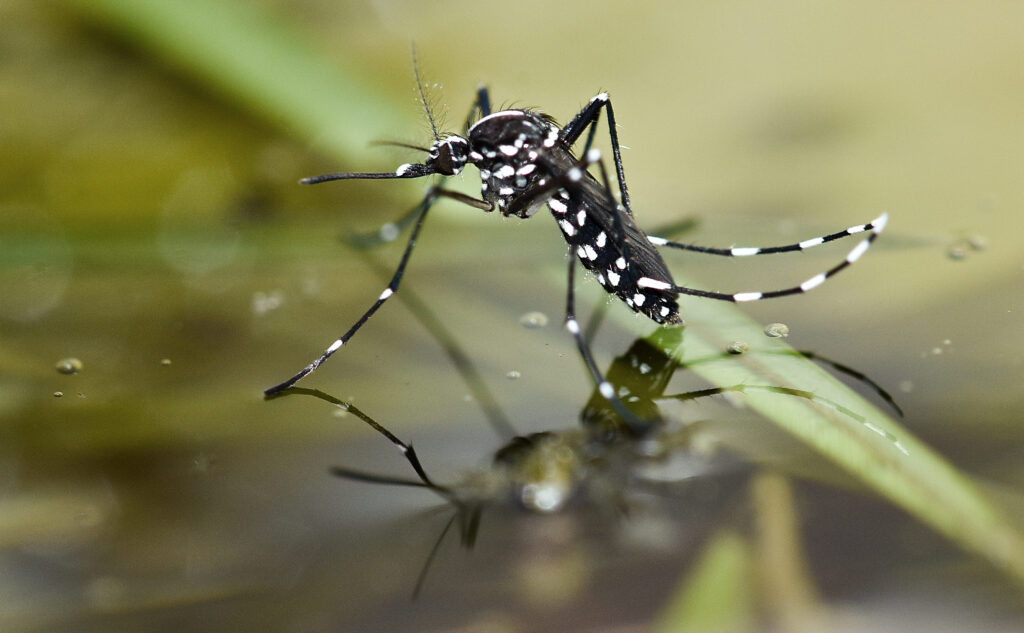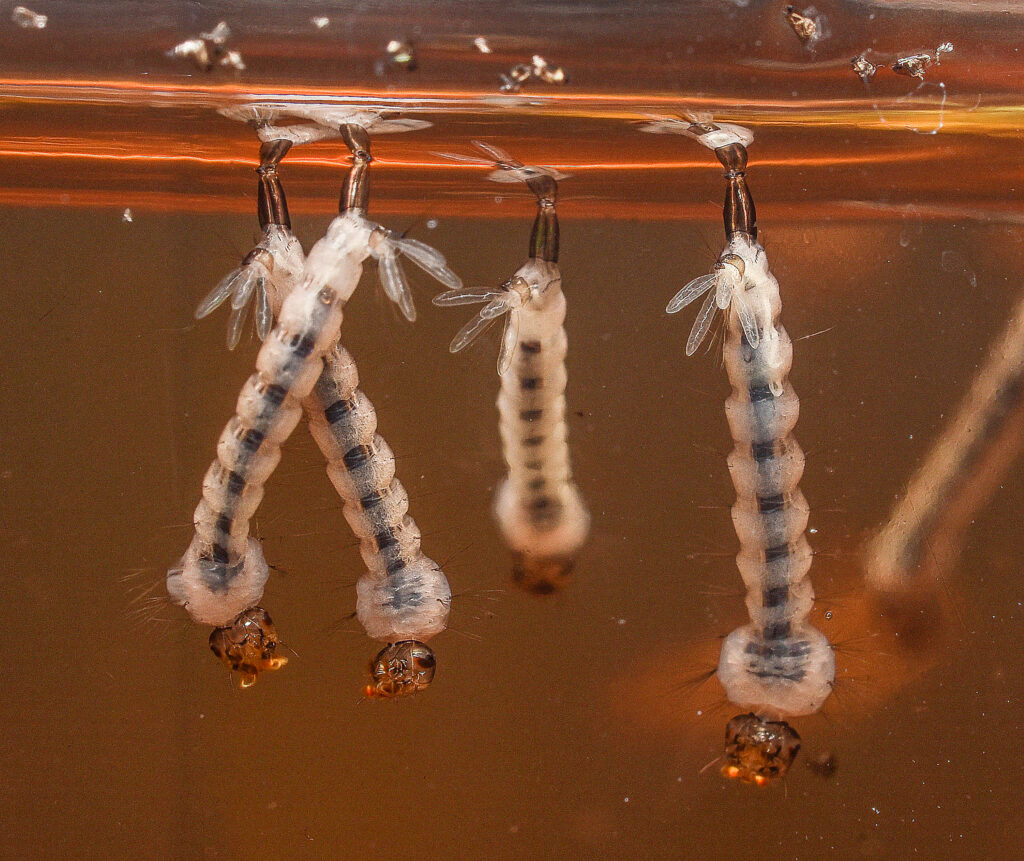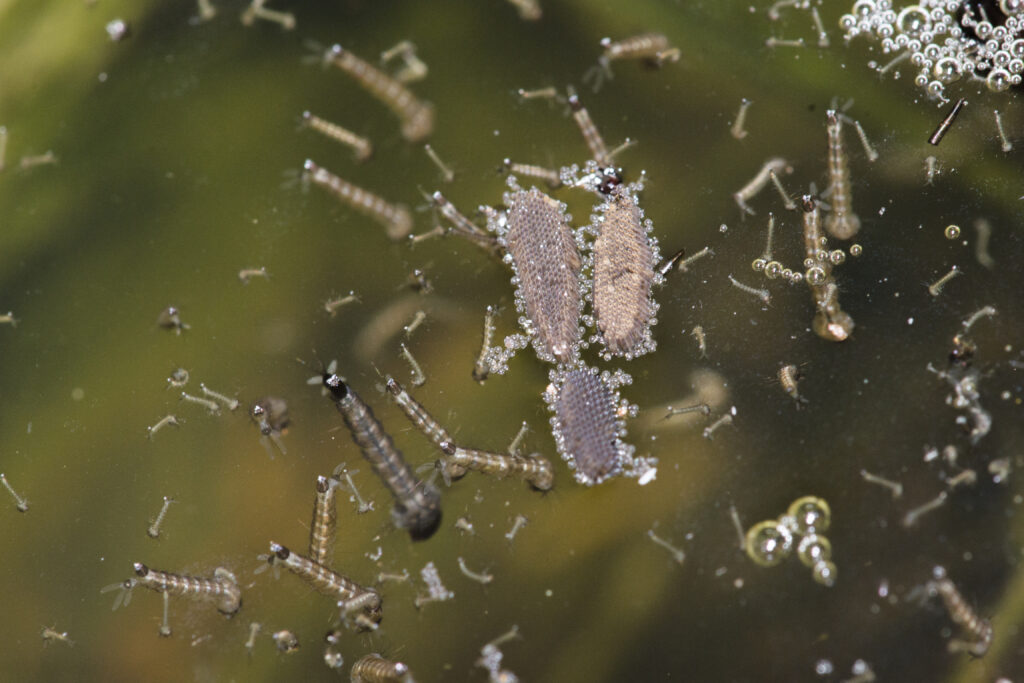Mosquitoes are not just a nuisance; they are carriers of diseases and can significantly impact your outdoor enjoyment. In the Raleigh-Durham area, we primarily encounter three species of mosquitoes: the Asian tiger mosquito, the house mosquito, and the yellow fever mosquito. Understanding these species and how to control them is crucial for maintaining a mosquito-free environment around your home.
Asian Tiger Mosquitoes (Aedes albopictus)

The Asian tiger mosquito is easily recognizable by its black and white striped body and legs. Originating from Southeast Asia, this mosquito has spread to many parts of the world, including North Carolina. They are aggressive daytime biters and are known to transmit diseases such as dengue, chikungunya, and Zika virus.
House Mosquitoes (Culex pipiens)
The house mosquito, or Culex pipiens, is a common species found in the Raleigh-Durham area. These mosquitoes are more active during dusk and dawn. They are known vectors of West Nile virus, encephalitis, and other diseases. Unlike the Asian tiger mosquito, Culex mosquitoes prefer to breed in stagnant water with high organic content, such as storm drains and sewage areas.
Yellow Fever Mosquitoes (Aedes aegypti)

The Aedes aegypti, also known as the yellow fever mosquito, is another significant pest in our region. It is identifiable by the white markings on its legs and a lyre-shaped pattern on its thorax. Aedes aegypti is notorious for spreading yellow fever, dengue fever, Zika virus, and chikungunya. They prefer to breed in clean, stagnant water, making flowerpots, buckets, and birdbaths ideal habitats.
Breeding Habits and Control Measures

Mosquitoes lay their eggs in or near water. These eggs hatch into larvae, commonly known as wigglers, which live in the water before developing into adult mosquitoes. This life cycle makes water management a critical aspect of mosquito control. Here are some effective ways to reduce mosquito breeding sites around your home:
- Eliminate Standing Water: Regularly check and empty containers that collect water, such as flowerpots, birdbaths, and gutters.
- Maintain Pools and Ponds: Keep swimming pools clean and properly chlorinated. If you have a pond, consider adding fish that eat mosquito larvae.
- Use Proper Drainage: Ensure proper drainage in your yard to prevent puddles and stagnant water.
Innovative Pest Solutions’ 1-2-3 Premium Service
At Innovative Pest Solutions, we offer comprehensive mosquito control as part of our 1-2-3 Premium Service. This service includes targeted treatments during the peak mosquito season to significantly reduce the mosquito population around your home. Our approach involves:
- Targeted Treatments: We focus on treating areas where mosquitoes rest and breed. Female mosquitoes, which are the ones that bite, often rest on vertical surfaces before feeding. By targeting these areas, we can effectively reduce their numbers.
- Selective Spraying: To protect important pollinators, we are selective in our treatments. We avoid areas frequented by bees and other beneficial insects while focusing on mosquito-prone zones.
- Seasonal Adjustments: Our treatments are adjusted seasonally to ensure maximum effectiveness, taking into account the varying mosquito activity levels throughout the year.
Add-On Mosquito Service
For customers who opt for our 1-2-3 Basic Pest Control Service, we offer an add-on mosquito treatment service. This add-on provides the same comprehensive mosquito control measures included in our premium service, ensuring your yard remains a comfortable and safe place to enjoy outdoor activities.
Understanding Mosquito Behavior
It’s important to note that only female mosquitoes bite, as they require blood meals to develop their eggs. By treating the resting areas of these female mosquitoes, we can prevent them from biting and reproducing. This method not only reduces the current mosquito population but also helps prevent future infestations.
Why Choose Innovative Pest Solutions?
Innovative Pest Solutions is committed to safeguarding families and protecting homes, health, and the environment. Our mosquito control services are designed with these values in mind. By choosing us, you benefit from:
- Expert Knowledge: Our team is knowledgeable about local mosquito species and their behaviors, ensuring effective and targeted treatments.
- Environmentally Responsible Practices: We use environmentally friendly products and methods to minimize the impact on beneficial insects and the surrounding ecosystem.
- Customer-Focused Service: Our services are tailored to meet the specific needs of each customer, providing personalized solutions and exceptional customer care.
Conclusion

Mosquito control is essential for enjoying your outdoor spaces without the annoyance and health risks posed by these pests. With over 60 species of mosquitoes in North Carolina, it’s important to focus on the major culprits in our area. By eliminating standing water and using targeted treatments, you can effectively reduce mosquito populations around your home.
For more information or to schedule a service, contact us today and take the first step towards a mosquito-free yard.




